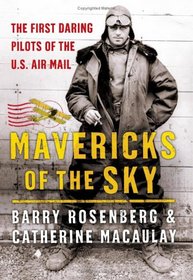While I knew there were deaths among the early pilots of the Postal Service, I never knew how many, so I was a bit disturbed by the total and how they happened to die. While the authors gave the early pilots and mechanics a lot of credit for working to ensure air mail succeeded, they also gave a lot of credit to Otto Praegar, the postal official in charge of creating and running the air mail service. Frankly, I decided early on he was just a typical governmental bureaucrat who made decisions without concern for how many people's lives he was ruining, or in this case... killing. Air mail would have succeeded without the rush that Praegar demanded, with planes not yet capable of flying safely in conditions the pilots experienced. And if you---the man flying the plane---balked at the terrible odds you knew you would experience, and decided not to fly... well, Praegar just fired you.
One item which interested me was that Katherine Stinson, already famous for her flying abilities, flew for the Postal Service, even if only for two days. She resigned in humiliation (the authors' word) because newspaper reporters---wanting to sell their papers--- made it look as if she was in a contest with the male pilots. You had to admire her for that.
The authors surprised me by stating President Woodrow Wilson's administration invoked severe measures to control the country during World War I. When was the last time the U.S. government took over all the privately-owned telephone and telegraph services so ensure no one could send messages the government didn't approve? A National Censorship Board monitored all walks of life. You couldn't send material through the mail if it, in some way, disagreed with government policy. Even music concerts had to begin with our nation's anthem, or arrests were made, as happened to the conductor of the Boston Symphony Orchestra. Some of this I already knew, others were new to me. Aside from being probably our most racist president, Wilson was definitely not the progressive president we are taught he was. The authors also mention that when he was severely ill---some historians suspect he suffered from the Spanish Flu---his second wife became our "first female president" when she controlled access to his sick room. When a cabinet members or other high official came with a problem, she would listen to him and then enter the president's room, after emerging she would tell the person what the president decided. But she actually made the decision. I first learned this while doing research on the Spanish Flu.
One of the first members of the military to help run the air mail was Major Charles Willoughby. He didn't last long as he was of German heritage, which meant he was under suspicion about his loyalties. And this is AFTER serving a year with the American forces in Europe. As a result he was soon replaced, even though he had excellent qualifications. In the Epilogue, the authors relate Colonel, later General, Willoughby served as General Douglas MacArthur's intelligence chief during World War II and Korea. In this position, Willoughby often gave MacArthur the intelligence he knew MacArthur wanted to hear, even when it meant hundreds, if not thousands, of casualties for our side. The authors also relate Willoughby received medals for participating in combat in the Philippines. My extensive readings of World War II belie this, as Willoughby never engaged in a combat operation in that war. But MacArthur often rewarded his toadies with medals and promotion they didn't deserve. Perhaps this is because MacArthur did the same for himself. In World War I he wrote himself up for a medal for bravery---which he received---for an action that happened nine miles from where he was. And he often told people he commanded the 1st Infantry Division during World War I, when he only commanded it for 10 days, and nine of those days were after the November 11, 1918 Armistice. Finally, Willoughby was as right-wing as they came, even MacArthur referred to him as "my pet fascist." After Korea, Willoughby retired from the service and became an advisor for Spanish dictator Francisco Franco, "Mr. Fascist" himself.
If I digress from the subject of the creation of postal air mail in the U.S., it is simply to show you shouldn't believe everything you read. I'm often amazed how some authors will do wonderful research on their subject---as I believe the authors of this book did---and then toss in information on another subject without triple-checking their sources with online sources---like Wikipedia---or area experts. You see this not just in History books, but in novels too.
In the end, I really enjoyed this book on the creation of the U.S. air mail and all its military, civilian, business and cultural aspects. The authors did a great job including personal stories about the pilots, mechanics, wives and the people in towns across America who interacted in some way with this new method of delivering that letter from your Aunt Jean.




